Derek Chauvin Trial
NAACP: "Not-Guilty Would Electrify a New
Wave of Activists"
AZ NAACP College Leader: "Protesting This Summer Regardless of Outcome"
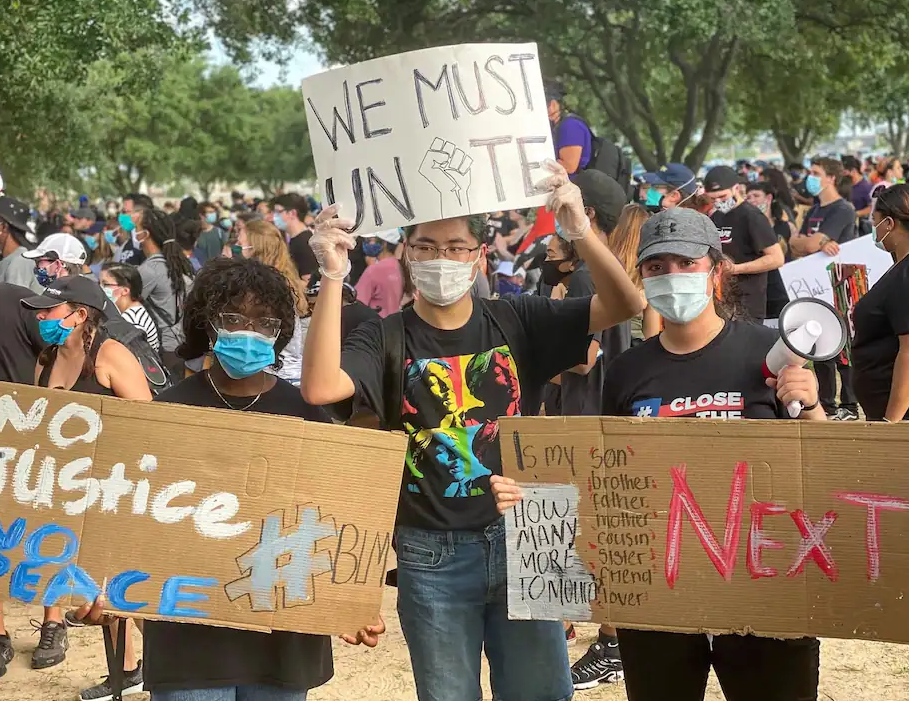
Washington Post Article - The Build Up To - Will There Be Blood?
Floyd's Killing - Another Call to Action For Gen
Z'ers With Sense of Urgency
Shaped by Black Lives Matter, Gen Z watches Chauvin trial with cynicism and
urgency: ‘What’s next?’
From the acquittal in Trayvon Martin's death, eight years ago, which
launched the Black Lives Matter movement, teenagers across the nation
watched nationally televised justice.
Many high school and college-age members of Gen Z, their formative years brought
gut punch after gut punch to their faith in the American criminal justice
system. Other
widely protested deaths of Black Americans followed Martin’s, spawning
hashtags and headlines but either no charges or no convictions: Eric Garner.
Michael Brown. Tamir Rice. Freddie Gray. Breonna Taylor.
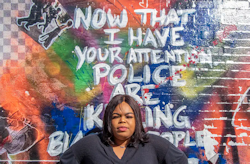 Now,
the generation that grew up with Black Lives Matter — increasingly activist,
attuned to inequity,
more likely than their elders to see far-reaching problems behind George
Floyd’s killing last May — is watching another case in which they have been
anguished bystanders but also
key witnesses and drivers of change. A White ex-police officer is in the
hands of a court system that
near-majorities of young adults have long viewed as unlikely to deliver
justice free from racial bias.
Now,
the generation that grew up with Black Lives Matter — increasingly activist,
attuned to inequity,
more likely than their elders to see far-reaching problems behind George
Floyd’s killing last May — is watching another case in which they have been
anguished bystanders but also
key witnesses and drivers of change. A White ex-police officer is in the
hands of a court system that
near-majorities of young adults have long viewed as unlikely to deliver
justice free from racial bias.
For Gen Z, Floyd’s case is “an orienting point for all their political values
coming to life,” said John Della Volpe, who directs polling at the Harvard
Kennedy School Institute of Politics and is writing a
book on the “Zoomer” generation, often defined as those born from 1997 to
2012. “It’s like Floyd being suffocated is almost a metaphor for millions of
other vulnerable people not having the opportunity that White people have had in
this country.”
More
racially and ethnically diverse than any generation that came before it,
Gen Z is no monolith, with differences of opinion along the usual lines of skin
color, class and political party. Compared with people of color, White Americans
were less supportive of last summer’s protests and less critical of police,
according to a Washington Post-Schar School poll.
But the jolt of Floyd’s killing would in some ways cross demographic gulfs,
experts say.
Last fall’s
Harvard Youth Poll found what it called “overwhelming support” across races
for more government action to confront systemic racism. Pew Research
said in the fall that more than half of White Republican adults under 30
years old reported taking steps to educate themselves on racial inequality
in the past few months, notably higher than White Republicans overall.
“So younger Whites were more aligned with other younger people, and not
necessarily their parents and their grandparents,” said Della Volpe, a longtime
leader in surveys of U.S. youths.
Floyd’s killing was another call to action for a
generation that already mobilized on mass shootings and climate change
— a group that shares many values with the millennials before them but stands
out for their sense of “urgency,” as Della Volpe puts it.
He said Floyd’s death and the racial reckoning that followed is
“certainly one of a top five, if not the most significant event in the
political development, the political maturation of Generation Z.” Young
adults lagged behind their elders in tracking news about the coronavirus
pandemic and the election, but that gap disappeared when it came to last year’s
Floyd protests,
according to Pew.
A not-guilty finding would electrify a new wave of
activists, predicted Armonee Jackson, a 23-year-old from Phoenix who
leads the youth and college division of the NAACP in Arizona. She sees
Floyd’s killing as an especially weighty turning point for the younger members
of Gen Z: “This was their Trayvon Martin,” she said, recounting the hoodie
she wore to eighth grade in protest of Martin’s death.
“This is going to be a make-or-break,” Jackson said, adding, “It’s either
going to push them harder or not, depending on the outcome of the case.”
She said she expects to be out protesting this summer
regardless of whether Chauvin is found guilty.
washingtonpost.com
&uuid=(email))
Superiors Aware of Chauvin's "Questionable
Decision-Making"
Chauvin trial again casts spotlight on MPD's training program
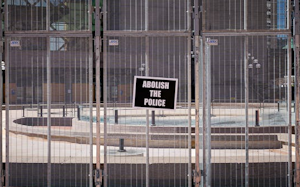 "Salty"
training officers can quickly set a rogue example for rookies.
"Salty"
training officers can quickly set a rogue example for rookies.
Over his 19 years with the Minneapolis Police Department, Derek Chauvin,
the now-fired officer on trial in the death of George Floyd, racked up 17
misconduct complaints and was involved in four on-duty shootings or other
fatal encounters.
Yet despite an ever-thickening personnel file, Chauvin continued to serve as
a field training officer, or FTO, even mentoring one of the two rookie cops
who first interacted with Floyd outside of a South Side convenience store last
May. In body camera footage, some of which was played during testimony last
week, that officer, J. Alexander Kueng, referred to Chauvin as "sir." The other
officer, Thomas Lane, followed Chauvin's direction to stay put after he
asked whether Floyd should be repositioned as they
pinned him to the ground before he lost consciousness and died.
Revelations about Chauvin's history and his conduct on the day Floyd died have
drawn further scrutiny of his training role even though his superiors were
aware of his at-times questionable decision-making.
Critics have blamed the training program for fostering a culture of aggressive
policing that stretches back decades.
To some, the larger problem is a tendency of some officers not to question and
intervene when a colleague — particularly a senior officer — uses excessive
force. After Floyd's death, Minneapolis Police Chief Medaria Arradondo announced
a stricter "duty to intervene" policy that says officers who witness another
officer "use any prohibited force, or inappropriate or unreasonable force" must
attempt to "safely intervene by verbal and physical means."
For years, groups like Communities United Against Police Brutality have pushed
for the department to adopt a peer intervention training program developed by
the New Orleans Police Department that is based on the premise that there is a
tendency for officers not to intervene when they see a colleague engage in
misconduct. The program, called
Ethical Policing Is Courageous, or EPIC, is built on the premise that
intervention must be taught through training and role-playing and must be
continually reinforced through more training to the point that it infuses the
departmental culture.
St. Paul police participate in the training, but Minneapolis has not. The
debate over police training has been brewing in Minneapolis in recent years
after a series of high-profile on-duty killings of civilians. In 2019, Mayor
Jacob Frey
announced the nation's first-ever ban on "warrior-style" and "fear-based"
training. The move was met with resistance from the Minneapolis Police
Federation — the union representing rank-and-file officers, which announced that
it would
offer the popular training free for any officer who wants it.
A
recent report by the Council on Criminal Justice Task Force on Policing
found that most U.S. police training lacks focus, is too short, uses ineffective
teaching methods and is out of touch with both community safety priorities and
current research about what works to minimize bias and use of force.
The trial wrapped up its first week of testimony on Friday, with longtime
Minneapolis police Lt. Richard Zimmerman testifying that the level of force used
by Chauvin on Floyd was "totally unnecessary" and dangerous.
startribune.com
&uuid=(email))
Here's the entire case
Floyd died of cardiac arrest - Not asphyzia or lack of oxygen - But ruled a
homicide
In the writer's opinion - if that stands Chauvin
could walk free
Cause of death at issue in Chauvin trial as prosecution questions medical
examiner's findings
Prosecutors trying the former Minneapolis police officer charged with
murder in George Floyd's death appeared to distance themselves last week from
the medical findings on his cause of death, issued by the only doctor who
performed an autopsy.
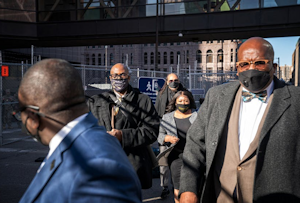 Special
Prosecutor Jerry Blackwell told jurors last Monday that while Hennepin County
Chief Medical Examiner Dr. Andrew Baker ruled Floyd's cause of death cardiac
arrest, prosecutors would prove he died of asphyxia, or, lack of oxygen,
while Chauvin knelt on his neck for more than nine minutes.
Special
Prosecutor Jerry Blackwell told jurors last Monday that while Hennepin County
Chief Medical Examiner Dr. Andrew Baker ruled Floyd's cause of death cardiac
arrest, prosecutors would prove he died of asphyxia, or, lack of oxygen,
while Chauvin knelt on his neck for more than nine minutes.
"This was … not a fatal heart event," Blackwell said in his opening
statement. "He died one breath at a time over an extended period of time."
In a PowerPoint presentation during his opening statement, Blackwell displayed
the names of six outside medical experts hired to help their case, including a
forensic pathologist — Baker's job — whom Blackwell spoke about at length while
mentioning Baker as an aside.
"What is unusual is that, to some extent, the battle of the experts is within
the state's case instead of between the state and the defense."
Chauvin's attorney, Eric Nelson, seized on the issue. To raise reasonable doubt,
he told jurors in his opening statement, "The state was not satisfied with Dr.
Baker's work so they have contracted with numerous physicians to contradict Dr.
Baker's findings, and this will ultimately be another significant battle in this
trial: What was Mr. Floyd's actual cause of death?"
He noted that Baker was the only person to perform an autopsy on Floyd.
"Dr. Baker found none of what are referred to as the telltale signs of
asphyxiation," said Nelson.
&uuid=(email))
"There was no evidence that Mr. Floyd's airflow was restricted and he did not
determine [it] to be a positional or mechanical asphyxia death."
Nelson argued that Floyd died of a cardiac arrest resulting from drug use and
pre-existing health issues, including heart disease and high blood pressure.
Bystander Darnella Frazier's graphic video showing Chauvin kneeling on Floyd
last May 25 while he repeatedly said he couldn't breathe has been played in
court several times, but a medical ruling on cause of death is still crucial to
the case, some attorneys said.
Medical examiners in Minnesota work independently of law enforcement and
prosecutors. They determine the cause and manner of death, but make no
determination about legal culpability.
"It seemed to me that essentially the prosecution is going to take the
position that Dr. Baker's autopsy report is incorrect or can be explained
more clearly," said Mitchell Hamline School of Law emeritus professor Prof. Joe
Daly. "It's extremely unusual … to cast doubt on your own medical examiner."
Baker's findings that Floyd's cause of death was "cardiopulmonary arrest
complicating law enforcement subdual, restraint, and neck compression"
sparked public outrage when they were released last June 1. Many, including
attorneys for Floyd's family, believed Floyd died of asphyxiation and criticized
Baker's ruling. An emergency fence and concrete barricades were erected around
Baker's downtown Minneapolis office two days after he issued his results; they
remain standing.
Baker listed hardening and thickening of the artery walls, heart disease and
drug use as "other significant conditions." Fentanyl and methamphetamine were
also found in Floyd's system.
Baker ruled the manner of death a homicide, a death that occurs at the hands
of another person.
"Dr. Baker offered that one possibility for the pathway of Floyd's death is that
Floyd's heart was starting to fail one of the symptoms is the perception that
you cannot breathe."
However Minnesota jury instructions, "To cause' means to be a substantial causal
factor in causing the death. …The fact that other causes contribute to the death
does not relieve the defendant of criminal liability."
It could pose a risk to the prosecution's case to distance themselves
from the in-house medical expert, said defense attorney Mike Padden.
"It absolutely can be a problem because he's the doctor who did the
autopsy," Padden said. "They're making a strategy decision that they're moving
completely away from him."
An abundance of complex medical testimony could also overwhelm jurors. The
defense has 15 medical experts listed as potential witnesses; it's unknown how
many will be called to testify.
startribune.com
&uuid=(email))
Floyd's Counterfeit $20 at Cup Foods
Cup Foods Clerk Offered to Cover the Counterfeit $20
Testimony at Derek Chauvin trial triggers talk of expectations for retail
workers to stopping theft
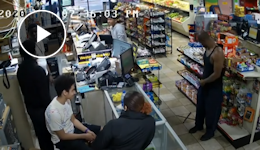 Trial
observers took to social media to voice their sympathy for Cup Foods clerk,
saying he shouldn't have been put in that situation.
Trial
observers took to social media to voice their sympathy for Cup Foods clerk,
saying he shouldn't have been put in that situation.
Cashier Christopher Martin thought something was off with the $20 bill a
customer used to pay for cigarettes last May at the south Minneapolis
convenience store where he worked. The bill was just a little too blue, and
Martin decided to flag a manager.
Before long, Martin saw the customer, later known to the world as George Floyd,
handcuffed on the pavement and pleading for breath under the restraint of
Minneapolis police, the life draining from his body.
Martin, 19, paced outside anxiously looking on in "disbelief and guilt," he
testified Wednesday in former police officer Derek Chauvin's murder trial. "If I
would have just not taken the bill, this could have been avoided."
Martin's gripping testimony triggered community discussions about retailers'
expectations of employees to prevent theft. It also garnered sympathy for
the young clerk who was thrust into an unenviable situation leading to Floyd's
arrest.
&uuid=(email))
Martin, who worked at Cup Foods and lived upstairs with his family at the time,
testified that the store's policy was that employees who accepted counterfeit
bills from customers had to cover the lost money out of their own paychecks.
Martin testified that another man came in first with a counterfeit bill and
they wouldn't accept it. Then Floyd came in with a bill that the clerk was
skeptical about.
Martin didn't know Floyd, but Floyd had been a friendly and talkative customer,
though he appeared under the influence, Martin testified. Martin was going to
let the fake $20 bill slide and pay for it himself if he had to. But after
second-guessing himself, Martin decided to tell his boss.
The manager sent Martin outside to go get Floyd from the vehicle where he
and others were sitting near the store. Floyd twice declined to go back
inside, and Martin said he offered to cover the fake $20, but the manager
instructed another co-worker to call police.
Martin later went outside as police were restraining Floyd, and Martin could be
seen on video surveillance pacing with his hands over his head. He testified
that he faced guilt about what happened to Floyd and later quit his job because
of safety concerns.
Trial observers took to social media to voice their sympathy for Martin,
criticizing store management and saying that he shouldn't have been put in that
situation.
Jamar Nelson, a spokesman for Cup Foods, said employees have been told that
their paychecks will be docked if they don't check bills that turn out to be
counterfeit, but the store hasn't actually ever docked paychecks because of fake
money. Upon hiring, employees are trained on how to determine if a bill is a
counterfeit with the help of pens that turn a fake bill a different color. A
money counter machine near the manager also finds fake bills, Nelson said.
It is not the store's policy to send employees out of the store to confront
customers, Nelson said. But because Floyd had a good relationship with the
store and managers felt Floyd might not have known the $20 bill was counterfeit,
it was deemed appropriate for employees to be sent to talk to him, Nelson said.
"Floyd was a frequent patron of the store and so that's why the manager sent
[Martin] back out to reason with him," Nelson said.
startribune.com